Pornography, Ideology, and the Internet
Pornography, Ideology, and the Internet
A Japanese Adult Video Actress in Mainland China
Mei Zhang
LEXINGTON BOOKS
Lanham Boulder New York London
Published by Lexington Books
An imprint of The Rowman & Littlefield Publishing Group, Inc.
4501 Forbes Boulevard, Suite 200, Lanham, Maryland 20706
www.rowman.com
6 Tinworth Street, London SE11 5AL, United Kingdom
Copyright 2019 by The Rowman & Littlefield Publishing Group, Inc.
All rights reserved . No part of this book may be reproduced in any form or by any electronic or mechanical means, including information storage and retrieval systems, without written permission from the publisher, except by a reviewer who may quote passages in a review.
British Library Cataloguing in Publication Information Available
Library of Congress Cataloging-in-Publication Data Available
ISBN 978-1-4985-6088-7 (cloth : alk. paper)
ISBN 978-1-4985-6089-4 (electronic)
 The paper used in this publication meets the minimum requirements of American National Standard for Information SciencesPermanence of Paper for Printed Library Materials, ANSI/NISO Z39.48-1992.
The paper used in this publication meets the minimum requirements of American National Standard for Information SciencesPermanence of Paper for Printed Library Materials, ANSI/NISO Z39.48-1992.
Printed in the United States of America
Contents
Pornography is often accompanied with conflict, argument, or debate in many countries. On one hand, it has been criticized intensively by feminists who claim that women are exploited, degraded and objectified in pornography (Kappeler 1986, 49). On the other hand, it is supported for the reason of anti-censorship or pro-sex. But what happens when pornography crosses cultural borders and migrates to the world of non-pornography? This book starts from the discussion of a pornography, but does not end with pornography. Rather, in my opinion, a pornographic star can be treated as a cultural product because it obtains rich cultural meanings. I want to assert that pornography is more than pornography. It is the reinterpretation of pornography by different social forces in the world of non-pornography in a cross-cultural context that leads to abundant possibilities. Thus this research transcends the catalogue of porn studies, but aims to contribute to the fields of both media and cultural studies and anthropology by the examination of the entire process of the migration of this pornographic star.
The migration of cultural products can be readily observed in recent decades because so many products are produced in one country and consumed in another. On the cultural effects of the migration of cultural products, the debate between the global homogenization paradigm and the creolization paradigm predominates in multiple disciplines, particularly media and cultural studies, and anthropology. For the most part, scholars either assume that the values within global products are accepted to be completely unchanged by local consumers or attribute the emergence of all their new meanings to the creativity of local consumers. Moreover, studies on the functions of intermediaries that mediate between foreign products and local consumers and the intermediate processes of the migration remain limited. This book aims to fill this research gap through a thorough examination of the case of Aoi Sola, a Japanese adult video (AV) actress who has achieved amazing popularity in mainland China since 2010. Mainly adopting ethnographic approach, this research shows a rounded picture of Sola, as she crossed cultural borders as a cultural product, underwent foundational transformations in the social meanings ascribed to her by the intermediaries and other local groups, and returned back to her original country, Japan.
The choice of the field in this research challenges the opposition between the field and home that predominated anthropology traditionally (Gupta and Ferguson 1997, 710). The connection to the field, the celebrity agencies which tend to mask its existence, was made successful because of my advantage of having studied and worked for years in Beijing, a city that can be called as home for me. Through fifteen-month participant observation inside the two Chinese agencies, this study reveals that the transformative intermediaries , Orchid and Sakura, played a significant role in the transformation of Sola in the Chinese context, even though their operations are usually invisible to outsiders. They not only assign new meanings to Sola but also attempt to remove Solas previous image as an AV actress and weaken the politically sensitive meaning created by Chinese Internet users. The findings challenge the conventional scholarly assumption that foreign products produced by global producers are consumed directly by local consumers or that the significance of these intermediaries can be ignored. The research demonstrates that it is inaccurate to assume that all the meanings of global products in their local contexts are created by foreign corporations or local consumers.
This study further extends the participant observation inside the realistic field to the virtual space of various media in different countries, particularly China and Japan, which can be called the second field. It demonstrates that multiple local groups, including intermediaries, Chinese commercial news portals, Party media, and Chinese Internet users, reinterpret Sola in different, even contradictory, ways. These groups respond to the dominant beliefs on pornography and Japaneseness in Chinese society according to their own interests and social positions. Thus, this research refutes the presumption that a local society is a coherent monolith in the acceptance of foreign cultural products. It argues that the competition and contestation between different local groups should be taken into account when conceptualizing the migration of cultural goods.
Finally, the book changes the readers understanding of Chinese Internet usage. By December 2017, there were 772 million Internet users in China, and the Internet penetration rate has reached 55.8 percent (Zhongguo wangmin guimo 2018). Through its examination of the ways Chinese Internet users identify with Sola, this book shows that Chinese youth regard Sola as a safe weapon with which to express their resistance against government censorship and also as a model of the struggle for upward mobility. This finding challenges the perception of some scholars that Chinese Internet users merely seek online entertainment, sexual freedom, or escape from real life in their viewing of foreign popular culture. The thorough examination of Chinese online life also makes this monograph a guidebook for the readers in different countries to understand how to market themselves or their companies by using social media and Internet more strategically.
This book could not have been finished without the help and support from a lot of people. I am very grateful to Dr. Dixon, Heung Wah Wong, my supervisor during the PhD program at the University of Hong Kong, for his inspirations and long-term instructions on this study. I also would like to thank Professor Louise Edwards, my co-supervisor, for her constructive comments and warm encouragements. No words can express my deep gratitude to them.
I would like to express my sincere gratitude to my husband, my parents, my parents-in-law, and my son who love me deeply and have given me a lot of support during the long research period. Dr. Guan Qingwen, Miss Lam Siu Wan, Mr. Hirano Junya, Dr. Edwin German P. Solis, and other friends that I met in Hong Kong and Japan also gave me precious emotional support.
I am very grateful to the University of Hong Kong for providing a scholarship to support me to do this study during the four-year PhD program, and to the Louise Cha Fund for Chinese Studies and East/West Studies in the Faculty of Arts, Reaching Out Award under the HKSAR Government Scholarship Fund 201314, and RGC Postgraduate Students Conference/ Seminar Grant 2014 for supporting my research.

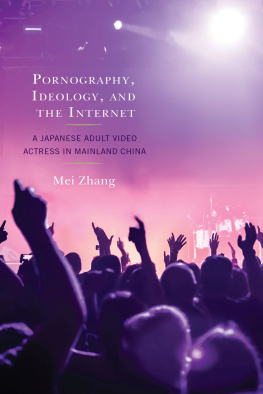
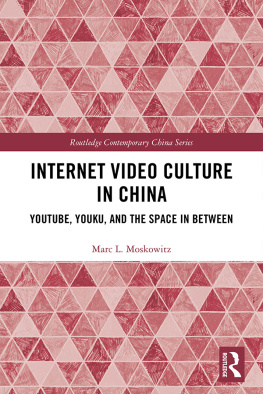
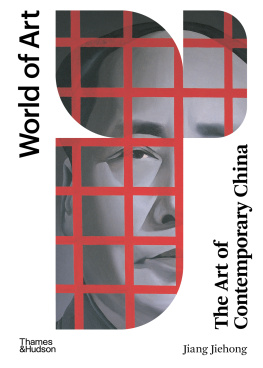

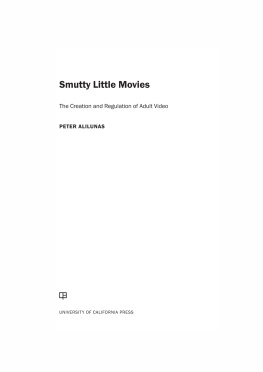
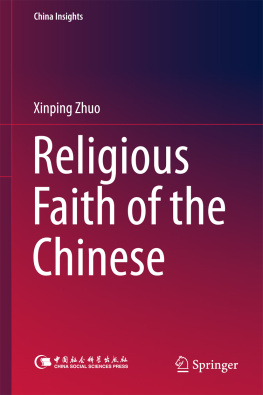

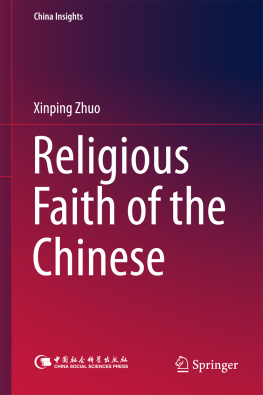
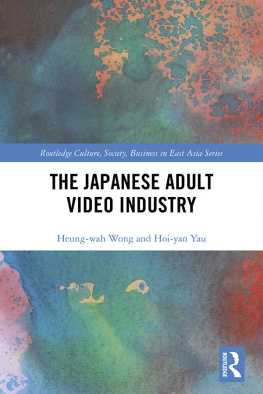

 The paper used in this publication meets the minimum requirements of American National Standard for Information SciencesPermanence of Paper for Printed Library Materials, ANSI/NISO Z39.48-1992.
The paper used in this publication meets the minimum requirements of American National Standard for Information SciencesPermanence of Paper for Printed Library Materials, ANSI/NISO Z39.48-1992.